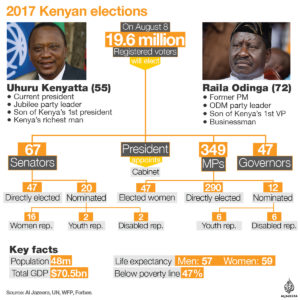
August 8, 2017//-The Government of Kenya should urge all parties to maintain the highest standards of behaviour before, during and after Tuesday’s elections to avoid a repeat of the 2007 violence, three United Nations rights experts have urged.
“We call on the Kenyan authorities to do their utmost to ensure peaceful elections, as well as a free and fair voting process tomorrow,” said the Special Rapporteurs on freedom of peaceful assembly and of association, Annalisa Ciampi, on the situation of human rights defenders, Michel Forst, and on summary executions, Agnes Callamard.
“Respect for people’s fundamental rights and freedoms – including the right to vote, freedom of expression, association and assembly are the key to free and fair elections and public participation,” they noted in a joint statement on the eve of the country’s general elections.
They said Kenya had made significant progress since 2007 in strengthening democracy, human rights and the rule of law, and noted it had taken important steps towards peacefully resolving tensions in the context of elections.
“However, in the light of recent incidents of political violence, the rise of hate speech and prevailing tensions, we emphasize the importance of all those involved in the process to commit themselves to peaceful conduct during and after elections,” they said.
“We also call on their supporters to remain peaceful and refrain from any incitement to violence,” they added.
The Special Rapporteurs welcomed the Government’s commitment not to shut down the internet, urging the authorities to ensure that media and civil society could report on and scrutinize the poll unhindered.
They also highlighted the responsibility of security forces to facilitate the holding of peaceful demonstrations, and to hold constructive dialogue with protesters in an effort to defuse any tensions.
“If any of the protests turn violent, the principles of precaution, legality, necessity and proportionality must be observed at all times,” they said.
“These tenets are the cornerstone of peaceful elections, and are key to maintaining an environment conducive to political dialogue, as well as the safety of people who have gathered to express their views in a peaceful manner,” the experts said.
Meanwhile, Aljazeera reports that Kenyans are casting their votes to elect a president and a new parliament following weeks of campaigning and claims of a plot to rig the results.
Polling takes place between 6.00am (3:00 GMT) and 5.00pm (14:00 GMT) local time with results expected to be announced within seven days.
More than 19 million voters have registered to cast their vote in Tuesday’s election in 40,883 polling stations across the country.
![Polling stations were crowded from the early hours of the day, with some voters queuing at stations as early as 1am [Hamza Mohamed/Al Jazeera]](https://africaneyereport.com/wp-content/uploads/2017/08/Kenya-2-300x169.jpg)
President Uhuru Kenyatta, 55, is seeking a second and final five-year term in office and faces stiff competition from an opposition coalition led by veteran politician Raila Odinga.
Odinga, 72, is running for the presidency for the fourth time.
Fourty three-year-old Aggrey Mwelesa, a father of four who works as a security guard, told Al Jazeera that he was happy to exercise his democratic right by voting in the election and the process was smooth.
“The exercise was smooth. Very calm. I came to the polling station at 2am. I pray for the best man for our country to win,” he said.
Alice Waithaka, a 35-year-old mother of two, said she had been queuing since 4am and did not experience any problems wile voting.
Polls have shown the two candidates – Kenyatta the son of the country’s founding father and Odinga former prime minister and son of the country’s vice president – neck and neck.
But no sitting president has ever lost an election in the East African country of 48 million people.
Five years ago Kenyatta defeated Odinga with the former prime minister disputing the results before they were confirmed by the country’s supreme court.
To win the election outright, either presidential candidate must garner at least 50 percent of the votes, plus one. Candidate must also get at least 25 percent of the votes in half of Kenya’s 47 counties to prevent a second round of voting.
If no candidate receives that, the election will go to a runoff, which would be a first in Kenya’s history.
The election is largely being fought over the economy and the courting of the youth vote. More than half of the registered voters are under the age of 35.
Kenyatta is promising to create more than one million new jobs in the country, which has the second biggest economy in the region. He also said he will reduce the cost of living in a country where 47 percent of the 48 million population live below the poverty line.
Odinga, on the other hand is promising to fight corruption. Transparency International – the global anti-corruption group ranks Kenya 145 out of 176 in its 2016 corruption index.
Odinga has also said he will create jobs for young people and make the country – which in recent years has experienced droughts – food secure.
In an interview with Al Jazeera earlier this week, Odinga said his party has put in place efforts to stop an alleged plot to tamper with results.
“There are attempts to manipulate the results,” Odinga said. “The only way [Kenyatta’s party] can win this election is by rigging.”
The country descended into violence in 2007 after the opposition, led by Odinga, claimed the election results were rigged in favour of the then incumbent Mwai Kibaki.
More than 1,000 people were killed in post-election violence and some 600,000 were displaced.
Kenyatta, while addressing a campaign rally last week, denied attempts to rig the elections and said the allegations by opposition leaders were a ploy to form a coalition government.
African Eye Report/Aljazeera



